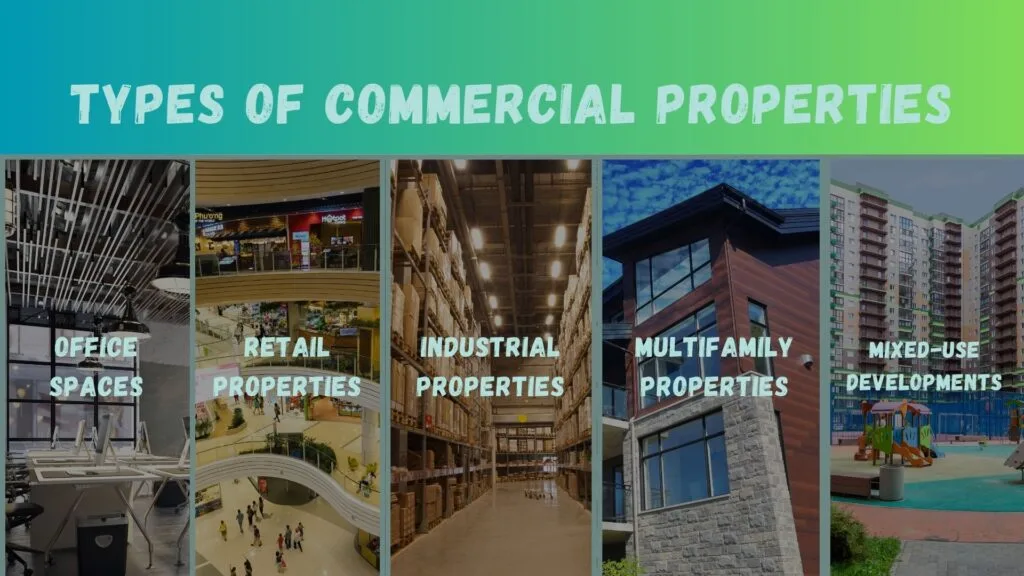Commercial properties are where businesses reside and thrive. Your favourite restaurant, office, gym, and every building where you spend your money or earn money is commercial property. The properties are intended for business purposes and can generate income from rent or lease to businesses. If you’ve considered investing in commercial real estate or want to understand more, this post is your guide that will walk you through the fundamentals. Here are things you will learn about:
- Basic of Commercial Properties
- Types of commercial properties
- What you should know before investing.
Understanding Commercial Properties

Commercial properties are lands, buildings, and complexes that are purchased with the intention of leasing or renting them out to businesses. Commercial real estate properties include office spaces, retailing spaces like shops and malls, warehouses, and even large apartment buildings where people rent homes.
Commercial properties play a much more significant role than we then realize. The coffee shop across from your office that you visit every day is a commercial property. The office itself is a commercial real estate. These properties are everywhere, and to be an investor, you must invest in a place where you can earn steadily.
But why invest in commercial properties? Why not go for a residential one? Isn’t it something that can provide more value and a place for you to live? And yes, it is also less risky.
Here’s why: commercial properties are large empty spaces rented or leased to businesses who want a space to work from. You can earn more rental income from commercial properties than a residential property. And the maintenance aspect drops down to the tenants, which means one of your expenses is reduced. Additionally, businesses are looking for a space for a longer period, like 5-10-15 years, which means your property will be full for a while. And most importantly, commercial real estate has the potential for very strong value appreciation.
Types of Commercial Properties
Commercial properties are available in various designs and sizes, all with a specific objective. It all depends on what you’re seeking- whether to buy, lease, or know the terrain- and understanding the different types of available commercial properties is essential. Let’s look at them in detail:

1. Office Spaces
Office spaces include office towers, business parks, or even smaller, standalone office buildings. These are the spaces where the management usually operates their functions or businesses that don’t need a plant full of labourers, such as banks. Office spaces in more affordable and non-central locations (Class B or C) usually earn a decent rental income. Spaces located in high-end areas and central locations (Class A) are likely to earn higher income, whether it’s for businesses or investors.
2. Retail Properties
Retail properties include shopping malls, strip malls, or even standalone stores. These are the spaces where businesses sell products or services directly to customers. You might wonder if the wave of online shopping has reduced the value of such investment, and you are partially right.
However, a large part of the population still prefers to shop physically. When someone has to make a big purchase, shopping online is more risky than going to a store and physically experiencing the product or service. Even people who live close to malls prefer to go and try the clothes on instead of online, where they have to use their imagination. So, even though the surge of online stores has been a factor, retail properties still have the same value.
3. Industrial Properties
Industrial buildings are spaces that are used for storage, manufacturing, or as a distribution centre. These include spaces like warehouses, factories, or research labs. Unlike retail and office spaces, industrial properties are usually established outside the city in industrial areas because of their size, and the operations conducted are to follow industrial laws.
As we discussed earlier, the surge of online stores may have damaged the retail industry, but here, it’s the opposite. Industrial properties like warehouses have become highly valuable because they help businesses store their products at the nearest hubs, making delivering the products easier and faster.
4. Multifamily Properties
This one is an oddball, a residential building to be considered a commercial property, but large complexes where many people rent homes are considered commercial real estate. These properties include small buildings with few units and large complexes with hundreds of apartments to be rented. Such multifamily property can be a great investment for investors to ensure a secondary income stream.
5. Mixed-Use Developments

Mixed-use developments are commercial real estate projects that combine the aspects of residential and commercial properties. Such properties are typically established in urban areas where people want the comfort of living close to various amenities.
Mixed-use buildings have apartments on the upper floor, office spaces in the middle, and restaurants and retail shops at the bottom, making it easier for the residents to access everything within minutes. Many societies are constructed with this concept in mind; such societies have residential areas in one sector, retail properties like malls in another, sports complexes in one, and office buildings in one, making life much more accessible.
Important: Understanding the types of commercial properties can help you understand what type of property your ideal investment is. For instance, office spaces can be great and provide exponential growth during booming periods. In contrast, industrial spaces keep growing regardless of the economy due to their dependence on e-commerce, while retail spaces need to adapt to changes in consumer behaviour.
Factors to Consider When Investing in Commercial Properties
Here’s the investor’s guide, which includes the things you should look for while selecting a commercial property to invest in.
1. Location
As it goes for every real estate investment, the first and main factor to consider is the property’s location. Research the area where it would benefit you the most based on the type of commercial property you plan to invest in. How do you decide what location would benefit which type of property? Here’s a quick guide:
- Office spaces should be near bustling business centres and nearby residential developments for better access for employees.
- Retail Shops should be accessible, and near residential areas, so more people can easily visit.
- Industrial properties should be in industrial areas, highways, or shipping routes.
- Also, consider extra factors like the popularity of the locality, transportation services, parking spaces, foot traffic, and nearby amenities.
2. Market Trends
As an investor, you should be aware of when investing in the market. And after that, you also have to figure out what is working in the current market. For instance, if you are pondering investing in a state where working from home is not a concept, office buildings and industrial spaces are much better options. But suppose the place has an option for working from home. In that case, you should lean towards mixed development or multifamily properties, as they have easy access for employees to sometimes visit the office but mostly work from home.
3. Tenant Quality
Once you have invested in the property, the next is to make sure that you get a quality and reliable tenant. A well-established business like McDonald’s is more likely to pay on time and occupy your space longer than a freshly started burger producer. Evaluate your potential tenant’s background and whether they are established enough to be trusted. You need a tenant who pays on time, stays for a long time, and cares for the property.
4. Property Condition and Management
As the owner, it’s your job to maintain your property and handle the rental aspects. Although, you can outsource this task to the property manager if you don’t have enough time to invest in management.
But be sure to inspect the property before investing, check the contractor’s background, inspect the product quality, and ensure that you have quality products that survive a long time because a place that needs continued repairs is likely to cut off a lot of your revenue.
5. Financing Options
Lastly, study commercial property loans before you buy one. Even if you have enough to purchase the property right away, it’s better to opt for a financing option and keep some of your money free for other investment options.
For financing, traditional financial institutions like banks require a larger down payment due to the risky nature of the property. They know that you will rent the property, unlike residential property, where the owner will likely live, providing more surety about payment. However, commercial property is subjected to market risks.
READ MORE Top 5 Emerging Markets for Commercial Properties in 2024
Frequently Asked Questions (FAQ)
What is the meaning of a commercial property?
Commercial properties are buildings or land rented or leased for business operations, such as offices, stores, or warehouses.
Which is an example of a commercial property?
A shopping mall is the most easy to understand example. A shopping mall is a retail, commercial property where every business rents out a store in the mall to exchange goods and services.
What is the difference between commercial and residential real estate?
Commercial real estate is rented or leased out for business operations, such as warehouses and malls, whereas residential property is lent to people who want to live there, like houses and apartments.
What type of commercial property is most profitable?
In 2024, industrial warehouses are considered the most profitable investment because of the increase in the e-commerce sector. Thanks to online stores, businesses need warehouses in every state and country to store their goods for quicker deliveries.
Final Statement
Commercial properties are a very attractive investment option if you want a high-earning income stream, but it’s not just that. It also provides you the opportunity to contribute to the society. Commercial properties offer businesses a space that helps them develop themselves, create new employment opportunities, and ultimately contribute to the area’s development. With proper market and tenant research, you can have a steady and high-earning source of income from this property while earning yourself some name in society.


3 thoughts on “What are Commercial Properties? ”